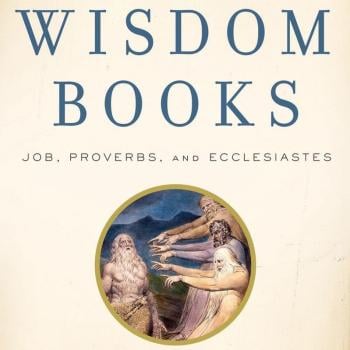Soon we will be doing a series of blog posts on the legacy of the Reformers and their effect on several contemporary scholars identified with the New Perspective on Paul. Here however I want to point out that some of the critical texts Luther, Calvin and Melanchthon used to base their Reformation theology can and probably should be read in a different way than they read them.
We Protestants are all products, even if various steps removed from the source, of the Protestant Reformation and how we read Paul in particular has been and is deeply influenced by the way Luther, Calvin, and Melanchthon read the key Pauline texts. And sometimes we have simply assumed that their readings of these texts are correct. And there is a cost to such a conclusion, a cost we might not wish to pay on closer inspection of what Paul actually says.
I take it as axiomatic that we should read Paul in light of his own Jewish and Greco-Roman contexts, and while we may read him along side of the Reformers, they were not, any more than we are, infallible interpreters of Paul. So we need to bear in mind from the outset that to question what the Reformers said about ‘wholly alien righteousness’ or ‘the righteousness of Christ’ or even ‘imputed righteousness’ is not the same thing as questioning Paul himself. So let’s start with a few facts, if we may.
Firstly, the noun phrase ‘the righteousness of Christ’ does not show up anywhere in Paul. Not once. Secondly, the term ‘theos’ overwhelmingly refers to God the Father in Paul. The exceptions to this rule are exceedingly rare. In Phil. 2.6 it is stated that the Son has equality with God, but even in that sentence the word God refers to the Father. Rom. 9.5 however seems to be a genuine exception to the rule, in a doxological remark, and Titus 2.13 may also be a reference to Christ as God, although the phrase ‘God our Savior’ elsewhere in Titus refers to the Father, and the sentence in question can be read as ‘while we await the blessed hope and the manifestation of the glory of our great God and Savior Jesus Christ’ or the last clause can be ‘of the great God and our Savior Jesus Christ’ in other words, both of them. Now I have no problems with the idea that Paul thought of Christ as God, or as part of the divine identity, to use Richard Bauckham’s language. But it is a fact that of the myriads of uses of the term theos in Paul’s letters, I have just mentioned all the possible cases where it does not refer to the Father. The default must surely be that when we find a use of the term in Paul, unless there are good contextual reasons to think otherwise, the term very likely refers to God the Father. And that brings us first to Rom. 1.16-17, the thesis statement of Paul’s magnum opus.
“For in the gospel the righteousness of God is revealed—- a righteousness that is from faith unto faith, just as it is written: “The righteous will live by faith.”
What does the phrase ‘the righteousness of God’ mean in that thesis statement? I am on record already in my Romans commentary as saying it definitely doesn’t refer to God’s covenant faithfulness. Why would God feel obligated to keep his Mosaic covenant promises when the covenant had been broken over and over again by his people? When the covenant is broken, since it is absolutely not a unilateral and unconditional covenant, and since Paul says in Gal. 4 and 2 Cor. 3 that it was a temporary covenant until Christ should come, and is also an obsolete covenant that Christ brought to an end as a way of righteousness (Rom. 10.4), there is no reason at all to read the phrase ‘the righteousness of God’ to refer to his loyalty to a pre-existing covenant. No, the righteousness of God is a reference to God’s character, and the clear proof of this is what follows in Rom. 1.18-32 where we hear about the wrath of God against present idolatry and immorality. E. Kasemann was right— the righteousness of God is a statement about God’s character, and what we can be sure of is that God will be faithful to his own character. He will be consistent, the same yesterday, today and forever. He is not quixotic when it comes to his character. But as for broken covenants, he has no obligation to them, and the new covenant is not simply a renewal of the Mosaic one, according to Paul it is the fulfillment of the Abrahamic one (again Gal. 4).
In Rom. 1.16-17 then we have a reference to the righteousness of God the Father, not Christ’s righteousness, and here it is apposite to point out that God the Father did not die on the cross for us, so this phrase does not likely have to do with Christ’s atoning death on the cross or imputed righteousness from Christ to us, etc. Since we have been unable to be righteous through keeping the Mosaic Law, God gives his righteousness to those who believe, in some, as of yet, undefined sense. The first time listeners in Rome to Romans 1, most of whom were not Paul’s own converts, would never guess Rom. 1.16-17 refers either to Christ’s righteousness or to ‘God’s covenant faithfulness’.
Rom. 3.22 should also be considered, since it is the recapitulation and amplification on the thesis statement in Rom. 1.16-17. Here Paul says ‘but the righteousness of God comes through the faithfulness of Christ (or, if you insist, through faith in Christ) unto all those believing.’ I personally don’t think Paul is being redundant here, so clearly the better translation is through the faithfulness of Christ. In other words, we get the righteousness of God the Father through the work of Christ on the cross, and this only comes ‘unto’ all those believing in that. Again, Christ is the mediator of our getting this righteousness which comes from God the Father, he is the means, but it is not Christ’s righteousness that we are getting!
Let us turn now to 1 Cor. 1.30, another text supposed to be about Christ’s righteousness. The text reads literally in the Greek ‘‘But from Him (the antecedent is theou so God the Father) you are, in Christ Jesus (who is our Wisdom from God), righteousness and holiness and redemption.’ Clearly, Christ is called our wisdom here, but the diagraming of the sentence shows that you is the subject, are is the verb, and the object of the verb in the main clause is righteousness etc. In other words, this is not about Christ being something for us other than our Wisdom. Its about what we become when we are in Christ, in his body. And Paul explains rather clearly in 1 Cor. 6.11 what he means by those terms— it means we’ve been washed, we’ve been sanctified, we’ve been set right. Christ did not need any of these things to happen for or to him— this is about what we’ve become. Indeed, of course Christ did not need to be saved, but we sure do. And this brings us to 2 Cor. 5.21.
What about 2 Cor. 5.21? It could certainly read ‘and the one not knowing sin was made sin for us in order that we might become the righteousness of God by it.’ Or the ending of the phrase may even be ‘in it’, with ‘it’, in this case referring to the atoning death of Christ, his being made sin for us, not referring to Christ himself but the event. En auto with the dative can certainly mean ‘by it’ or also ‘by him’. It need not mean ‘in Him’. If this is correct, then there is no reference in this text either to Christ being righteous for us, or us only being righteous in union with him the Righteous One.
One more thing— ‘he was made sin’ does not mean ‘he was made a sinner’ (which was Luther’s suggestion, and so like us in our fallennesss) so that we might become Him or like him through union with him. ‘He became sin’ likely refers to his becoming the sin bearer who takes away the sins of the world (ala scapegoat), or it refers to his taking the punishment for our sins in our place. It is us who become ‘the righteousness of God’ in or by it (i.e. the atoning death of Jesus), or by Him (he’s the mediator or the means of our becoming this).
In other words, the grammar is not such that we are forced to conclude that Paul is talking about ‘a wholly alien righteousness’ that we never actually receive, but because we are in union with Christ, he gets to be this for us, or in our place. This sort of reading of Paul hardly comports with what Paul actually does say about being a new creature in Christ with the old person having already passed away, or what he says about inwardly being renewed day by day while outwardly we waste away (see 2 Cor. 3-5). Paul believes that conversion not only sets us in right standing with God (our position), it also involves a change in our condition as well, so that we might become holy, become the righteousness of God, and so on, though this happens progressively and in an ongoing process as we work out our salvation which God works in us to will and to do.
What then of Phil. 3.9— there are several ways to translate this but to my mind the one that makes most sense involves an allusion to the death of Christ, by using the phrase ‘the faithfulness of Christ’ which refers to his faithfulness even unto death on the cross. So the verse reads ‘so I might be found in Him not having a righteousness of my own that comes from the Mosaic Law, but rather one that comes through the faithfulness of Christ, the righteousness that comes from God himself based on faith’. In the Greek, the distinction here is clear that righteousness comes to us through (dia) Christ the mediator, but it comes from (‘ek) God the Father. In other words, it’s God’s righteousness we are talking about which we received because of the finished work of Christ on the cross.
So let’s put the pieces together now: 1) the basis of the believer’s right standing with God the Father is the atoning death of Jesus; 2) Christ faithfully became the sin bearer and took the punishment for our sins, so we could be reconciled to God the Father; 3) but the goal was not merely to re-establish our relationship with God, but to change our fallen character, so we can begin to emulate the character of Christ, with the eventual goal of full conformity to the image of Christ; 4) this is not about a ‘wholly alien’ righteousness, or Christ being righteous in our stead, or a legal fiction where God counts us as righteous when we are actually not. It is about becoming new creatures in Christ, and being inwardly renewed day after day.
In short, the Reformers were so worried about ‘works righteousness’ that they over-read these texts in a way that referred to the righteousness of Christ himself, when in fact they refer to the righteousness of God the Father, the one who said in the first place— ‘be ye holy, as I am holy’. Let me be clear— salvation is by grace through faith. Sanctification is by grace through faith. None of this has anything to do with meritorious good works, or works being the basis of salvation. What it has to do with is correctly interpreting Paul in his original Jewish context. On that score, the Reformers dropped the ball in several ways.
One final point. The idea of imputation comes from the Latin Vulgate and its renderings of the Greek. When Erasmus translated the Latin back into Greek, he retained that notion in Romans, even though its not really there in the original Greek! On this read my Romans commentary on Rom. 3-5.















